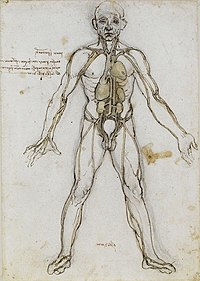List of Systems of the Human Body
The main systems of the human body are:
 |
| Part of a series of lists about |
| Human anatomy |
|---|
- Circulatory system:
- Circulates blood around the body via the heart, arteries and veins, delivering oxygen and nutrients to organs and cells and carrying their waste products away.
- Keeps the body's temperature in a safe range.
- Digestive system and Excretory system:
- System to absorb nutrients and remove waste via the gastrointestinal tract, including the mouth, esophagus, stomach and intestines.
- Eliminates waste from the body.
- Endocrine system:
- Influences the function of the body using hormones.
- Integumentary system(skin) / Exocrine system (glands):
- Skin, hair, nails, sweat and other exocrine glands
- Immune system and lymphatic system:
- Defends the body against pathogens that may harm the body.
- The system comprising a network of lymphatic vessels that carry a clear fluid called lymph.
- Muscular system:
- Enables the body to move using muscles.
- Nervous system:
- Collects and processes information from the senses via nerves and the brain and tells the muscles to contract to cause physical actions.
- Renal system and Urinary system
- The system where the kidneys filter blood to produce urine, and get rid of waste.
- Reproductive system:
- The reproductive organs required for the production of offspring.
- Respiratory system:
- Brings air into and out of the lungs to absorb oxygen and remove carbon dioxide.
- Skeletal system:
- Bones maintain the structure of the body and its organs.
12. Medical science does not include the human mind as a "system" of the body, but without it how do the other 11 systems function? The brain is listed as part of the Nervous system, however, as the brain is physical, the mind is spiritual. Without the spiritual component, human beings would be no different than plants or animals.
The mind is where imagination, inspiration, faith, hope and love originate. The mind is the set of thinking faculties including cognitive aspects such as consciousness, perception, thinking, judgement, language and memory, as well as non-cognitive aspects such as emotion.
With these twelve systems in the human body, how is it that Big Phama can come up with thousands of "medicines" for only twelve systems? Some drugs are necessary to stabilize a patient, but no one should be on multiple meds for life.
The mind is where imagination, inspiration, faith, hope and love originate. The mind is the set of thinking faculties including cognitive aspects such as consciousness, perception, thinking, judgement, language and memory, as well as non-cognitive aspects such as emotion.
With these twelve systems in the human body, how is it that Big Phama can come up with thousands of "medicines" for only twelve systems? Some drugs are necessary to stabilize a patient, but no one should be on multiple meds for life.